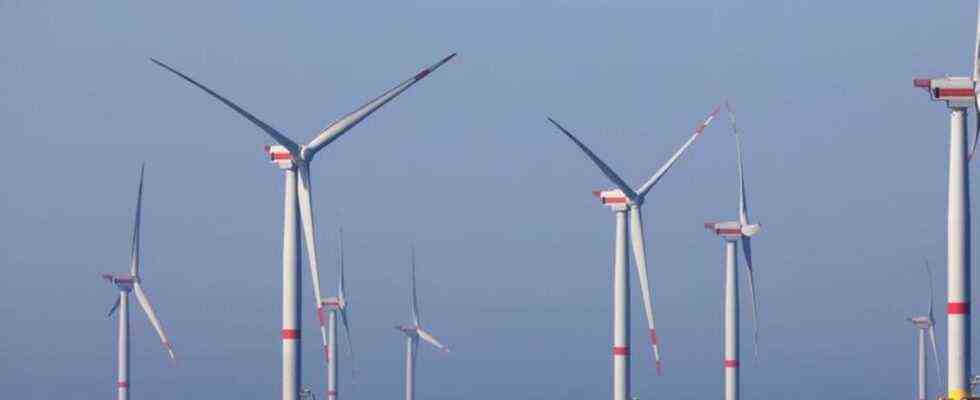Wind energy
New wind farm – industry hopes for a new federal government
Wind turbines of the “Wikinger” wind farm in the Baltic Sea off Rügen. Photo: Bernd Wüstneck / ZB / dpa
© dpa-infocom GmbH
Iberdrola is planning another wind farm in the Baltic Sea. In order for the expansion of wind power in Germany to continue, a suitable political framework is required, says the industry.
The expansion of wind energy continues: The energy company Iberdrola wants to expand its wind park cluster in the Baltic Sea with a third offshore wind park.
The project, called “Windanker”, is scheduled to go online in 2026 with a capacity of 300 megawatts, as the company announced on Friday. The investments are estimated at 800 million euros. At the same time, the industry is formulating wishes for the new federal government.
“Wind anchor” is the first wind farm in the German Baltic Sea that is to be implemented without state funding, explained Iberdrola. This means that the electricity is not remunerated at a predetermined market premium. Instead, large parts of the service are to be marketed through long-term contracts with customers.
Since the Baltic Sea is sometimes more demanding than the North Sea for the construction of offshore wind farms, for example with a view of the subsurface, implementation under market conditions is a challenge, explained Iberdrola Germany boss Iris Stempfle. However, one can, among other things, fall back on existing experience in the Baltic Sea and use synergies with other wind farms there.
“Wind anchor” is to become part of a group of three Iberdrola wind farms off the island of Rügen, one of which is already in operation and one is under construction. After a total investment of 3.5 billion euros, this “Baltic Hub” should have a capacity of 1.1 gigawatts by 2026.
According to his own statement, Stempfle hopes for more dynamism in the expansion of offshore wind energy in Germany. “We have great hopes in the new federal government.” This involves, for example, the allocation of areas and species protection. “We have to do what we can to ensure the protection of native species and at the same time think more ambitiously as a society if we want to achieve the energy transition.”
In addition, she would like those in power to «not change the rules of the game during the game». She referred to the meanwhile reduction of the expansion targets by the federal government. These were reduced in 2014 due to the initially high need for subsidies and the corresponding increases in the price of electricity. As a result, there was an interruption in expansion, known in the industry as a “thread break”.
According to Andreas Mummert, Head of Policy at the Offshore Wind Energy Foundation, this thread break has also led to the loss of companies and jobs. The expansion targets have meanwhile been raised again and are currently 20 gigawatts by 2030 and 40 gigawatts by 2040. However, according to Mummert, that is not enough either. Studies have shown that Germany will need at least 70 gigawatts by 2045 to achieve its climate goals. 7.76 gigawatts are currently connected to the grid in the North and Baltic Seas.
Mummert is also optimistic about the future federal government: The Bundestag had the strongest support for offshore with the Greens and the SPD. “In this respect, we are optimistic about a possible traffic light constellation.” The election victory of the SPD in Mecklenburg-Western Pomerania was also very welcome from an offshore industry perspective. “We have a very good exchange with Ms. Schwesig’s government and the relevant ministries.”
Mecklenburg-Western Pomerania’s Prime Minister Schwesig (SPD) saw offshore wind farms as an opportunity for the state. “The construction and operation of the wind farm will create additional jobs,” she was quoted by Iberdrola on Friday. «We need more
Wind farms at sea, so that the energy transition can succeed. “
With regard to the network expansion, Stempfle said: “Unfortunately, this is an absolute bottleneck that the landed energy cannot be transported away.” Operators have great local resistance, the approval process takes endlessly long and is very expensive. “We have to solve this challenge as quickly as possible.”
As a market, Germany is in competition with other countries. “In other words, the respective market conditions ultimately also determine the extent to which we are involved in the respective countries.” The new wind farm shows that Germany is one of the strategic markets for Iberdrola. One wants to get involved in the Baltic Sea region in the long term. “The extent to which we will take a closer look at the North Sea will be decided at short notice.”
According to Mummert, the question of a new funding regime must be clarified in the new legislative period. There is broad political consensus. For example, models are being discussed according to which producers are paid the difference if the electricity price falls below a certain amount. Conversely, they would have to pay themselves if the electricity price exceeded a certain amount. The considerations also depended on the expectations regarding the development of electricity prices. With a view to the upcoming decisions on store design, Stempfle said: “There will still be music in the coming months.”

